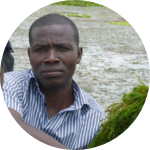About This Project
Clean water is a vital resource and access to clean water is considered by most to be a human right. Many countries have well established programs that monitor waterways in order to ensure this right. This is not true for Cote d'Ivoire, where I am from. One large obstacle for scientists of Cote d'Ivoire is lack of funding and equipment. I am raising funds to purchase a water quality probe to bring back to my country to test the water quality.
Join my project, and I'll keep you up to date on our progress through the lab notes.Ask the Scientists
Join The DiscussionWhat is the context of this research?
Water resources are one of the major components of environmental resources threatened by exploitation and pollution due to human activity. In developing countries, good quality water is scarce because of environmental pollution and degradation. In Cote d'Ivoire, freshwaters are particularly stressed due to industrial effluent discharges, use of the fertilizers and pesticides, the construction of dams and deforestation. An impact of these perturbations is the spreading of macrophytes in various aquatic systems of the country. Therefore, regular monitoring of water resources in this area is important for proper management strategies. Unfortunately, the only national program describing the water quality in freshwaters is outdated since it was in 1994.
What is the significance of this project?
This project will create a baseline of data that can be used to detect changes over time, and assess the effects of specific instances of contamination in various freshwaters. This information is crucial as some populations in Cote d'Ivoire continue to use river waters for domestic use (e.g., cooking, drinking, washing) and every year, cholera affects several thousand people in the country. The project will also help to train four students. Ultimately, this project will allow me a technical and material autonomy in this area.
What are the goals of the project?
The aim of the study is to study the status of freshwaters of Cote d'Ivoire in terms of physico-chemical characteristics of water. The former data in the area are outdated. For this purpose the common chemical parameters (pH, dissolved oxygen, conductivity, total suspended solids, turbidity, nitrate, phosphate and dissolved inorganic silica, water depth, salinity) will be tested. Moreover, samples for biogenic silica (BSi) and dioxide carbon (CO2) will be also collected.
Budget
Funds are needed for one multi-parameter probes (AquaProbe, AP-5000) that costs $4900.00. This probe combined with a Global Positioning System (GPS) is the cheaper in term of quality and price in comparison to other probes (YSI 6920 V2, Horiba U53, Hach Hydrolab MS5, Insitu Troll 9500 XP, Manta 2) and can collect up twenty four parameters.
Meet the Team
Team Bio
I have been studying biogeochemical processes since 2006 in various tropical aquatic systems (mangroves, rivers, lagoons, and estuaries) focusing on CO2 and CH4 air-water exchanges toward the atmosphere. These ecosystems are strikingly under sampled and poorly understood. I obtained my Ph.D in 2008 in Belgium and since 2009, I've been a researcher at the Centre de Recheches Oceanologiques d'Abidjan (Cote d'Ivoire) (http://www.cro-ci.org/).
Mathieu Kone
Dr. Mathieu KONE has been studying biogeochemical processes since 2006 in various tropical aquatic systems (mangroves, rivers, lagoons, and estuaries) focusing on CO2 and CH4 air-water exchanges toward the atmosphere. He obtained his Ph.D in 2008 in Belgium, and since 2009, has been a researcher at the Centre de Recheches Oceanologiques d'Abidjan (Cote d'Ivoire) (http://www.cro-ci.org/). He is currently on a Fullbright Scholarship at Yale University.
Peter A Raymond
Dr. Peter Raymond is a Professor of Ecosystem Ecology at Yale University. His research focuses on how watershed variables (e.g., land cover) and internal processes (e.g., primary production) alter the carbon chemistry of streams, rivers and estuaries. This work links into efforts worldwide to gain a better understanding of the carbon cycle due to the linkages between increased atmospheric CO2 and global change yet also strives for a better understanding of how these ecosystems function in general. His efforts include coupling previously collected stream/river data with digitally available information on climate and land-use, field measurements at various space and time scales, and isotopic studies.
Project Backers
- 6Backers
- 6%Funded
- $259Total Donations
- $43.17Average Donation

